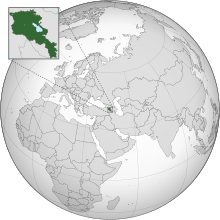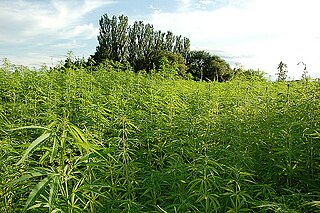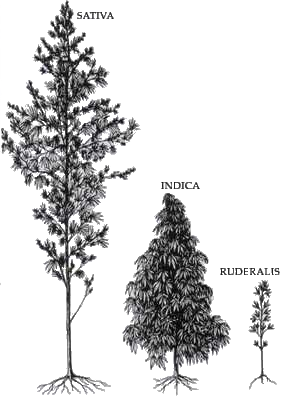 Location of Armenia (dark green) | |
| Medicinal | Illegal |
|---|---|
| Recreational | Illegal |
| Hemp | Illegal |
Cannabis in Armenia is illegal for all uses.
 Location of Armenia (dark green) | |
| Medicinal | Illegal |
|---|---|
| Recreational | Illegal |
| Hemp | Illegal |
Cannabis in Armenia is illegal for all uses.
Armenia cultivates some small amounts of cannabis, mostly for local consumption. Some indigenous strains of cannabis grow in the wild in Armenia, but a large degree of those blooms have been subject to state sponsored eradication. [1] Armenia also serves as a transit route for hashish coming from Central Asia, headed for Europe and the United States. [2]
Cannabis and hashish comprises the majority of recreational illicit drug usage in Armenia. Nevertheless, lifetime drug use among teenagers is among the lowest in all of Europe (4-7%). [3] Consumption is more prevalent among men in Armenia. [4] While prior cannabis use has been decriminalized as of 2009, those caught possessing are subject to heavy fines and an average jail sentence of two months. [5]
In 2019, there were rumors that cannabis would become decriminalized in Armenia, however the Ministry of Health of Armenia confirmed that there were no such plans for the time being. [6]
In February 2021, the Government of Armenia announced plans to allow cultivation of industrial hemp as a part of an economic programme to boost the economy. The Minister of the Economy, Vahan Kerobyan, noted that the authorities, including law enforcement, would maintain control and oversight of the process of hemp production, to ensure that Armenian drug legislation is not breached. [7]
At present, there is also another cannabis-related draft law in Armenia's parliament which has been under discussion since December 2019. The law would allow the use of psychotropic drugs. [8]

In the United States, increased restrictions and labeling of cannabis as a poison began in many states from 1906 onward, and outright prohibitions began in the 1920s. By the mid-1930s cannabis was regulated as a drug in every state, including 35 states that adopted the Uniform State Narcotic Drug Act. The first national regulation was the Marihuana Tax Act of 1937.

Drug liberalization is a drug policy process of decriminalizing, legalizing, or repealing laws that prohibit the production, possession, sale, or use of prohibited drugs. Variations of drug liberalization include drug legalization, drug relegalization, and drug decriminalization. Proponents of drug liberalization may favor a regulatory regime for the production, marketing, and distribution of some or all currently illegal drugs in a manner analogous to that for alcohol, caffeine and tobacco.

Oregon Ballot Measure 80, also known as the Oregon Cannabis Tax Act, OCTA and Initiative-9, was an initiated state statute ballot measure on the November 6, 2012 general election ballot in Oregon. It would have allowed personal marijuana and hemp cultivation or use without a license and created a commission to regulate the sale of commercial marijuana. The act would also have set aside two percent of profits from cannabis sales to promote industrial hemp, biodiesel, fiber, protein, and oil.

Cannabis in India has been known to be used at least as early as 2000 BCE. In Indian society, common terms for cannabis preparations include charas (resin), ganja (flower), and bhang, with Indian drinks such as bhang lassi and bhang thandai made from bhang being one of the most common legal uses.

Cannabis in Portugal is decriminalized, as a result of the decriminalization of all drugs in Portugal in 2001. Medical use of cannabis was legalized in 2018.

Cannabis had been illegal in Morocco since the nation's independence in 1956, reaffirmed by a total ban on drugs in 1974, but was partially tolerated in the country. Cannabis has been cultivated in Morocco for centuries and the country is currently among the world's top producers of hashish. As of 2024, Morocco was the world's top supplier of cannabis. On May 26, 2021, the Moroccan parliament voted to legalize the use of cannabis for medical, as well as cosmetic and industrial purposes.

Although Cannabis use is illegal in Egypt, it is often used privately by many. Law enforcements are often particularly lax when it comes to cannabis smokers, and its use is a part of the common culture for many people in Egypt. However, Large-scale smuggling of cannabis is punishable by death, while penalties for possessing even small amounts can also be severe. Despite this, these laws are not enforced in many parts of Egypt, where cannabis is often consumed openly in local cafes.

Cannabis in New York has been legal for medical purposes under New York law since 2016, and recreational purposes since 2021. As of 2022, recreational cannabis is for sale legally in the state, only through state-approved dispensaries.

Cannabis in Colombia is fully legal for medicinal purposes and for industrial purposes.

Cannabis in Germany has been legal for recreational usage by adults in a limited capacity since 1 April 2024. As of February 2024, it has been assessed that 4.5 million Germans use cannabis.
Cannabis in Italy is currently legal for medical and industrial uses, although it is strictly regulated, while it is decriminalized for recreational uses. In particular, the possession of small amounts of marijuana for personal use is a civil infraction. The possible sanctions for possession vary from the issuing of a diffida to first offenders, which is an injunction not to use the drug again; to the temporary suspension of certain personal documents for repeat offenders. Conversely, the unauthorized sale of cannabis-related products is illegal and punishable with imprisonment, as is the unlicensed cultivation of cannabis, although recent court cases have effectively established the legality of cultivating small amounts of cannabis for exclusively personal use. The licensed cultivation of cannabis for medical and industrial purposes requires the use of certified seeds; however, there is no need for authorization to plant certified seeds with minimal levels of psychoactive compounds.

Cannabis has been cultivated in Japan since the Jōmon period of Japanese prehistory approximately six to ten thousand years ago. As one of the earliest cultivated plants in Japan, cannabis hemp was an important source of plant fiber used to produce clothing, cordage, and items for Shinto rituals, among numerous other uses. Hemp remained ubiquitous for its fabric and as a foodstuff for much of Japanese history, before cotton emerged as the country's primary fiber crop amid industrialization during the Meiji period. Following the conclusion of the Second World War and subsequent occupation of Japan, a prohibition on cannabis possession and production was enacted with the passing of the Cannabis Control Law.
Cannabis in Latvia is illegal for recreational and medical purposes, but production of industrial hemp is permitted.

Cannabis is illegal in Pakistan for recreational use, although since September 2020, extracts of cannabis can be used for industrial and medical use. Cannabis is widely consumed in Pakistan as charas and bhang.

Cannabis is illegal in Turkey for recreational use, but allowed for limited medical and scientific purposes. The Turkish term for cannabis is kenevir.
The list includes and details significant events that occurred in the global history of national-level implementations of, or changes made to, laws surrounding the use, sale, or production of the psychoactive drug cannabis.
Cannabis in Guatemala, as of 2016, is illegal. Otto Pérez, when he was president of the country, tried to lead a legalization drive, and several congressmen attempted to pass a law for legalization, but those efforts failed. A poll conducted in 2012 said that 41% of Guatemalans might support decriminalization.

Terms related to cannabis include:

The history of cannabis and its usage by humans dates back to at least the third millennium BC in written history, and possibly as far back as the Pre-Pottery Neolithic B based on archaeological evidence. For millennia, the plant has been valued for its use for fiber and rope, as food and medicine, and for its psychoactive properties for religious and recreational use.

The following outline is provided as an overview of and topical guide to the plant Cannabis sativa and its relatives Cannabis indica and Cannabis ruderalis, the drug cannabis (drug) and the industrial product hemp.